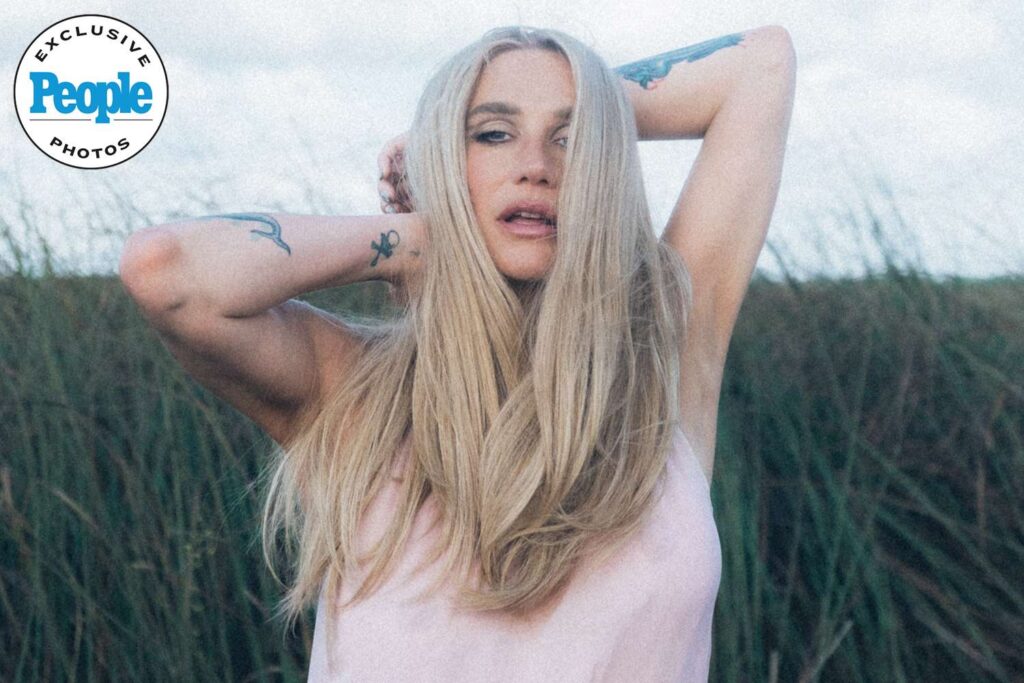NEED TO KNOW
Kesha discovered art’s healing properties at a young age. Raised by songwriter and single mom Pebe Sebert, the family didn’t have much — but they had music.
“When I was little, we were on food stamps,” the pop star, 38, tells PEOPLE in this week’s issue. “I remember thinking, ‘What makes people really happy when they’re having a hard time? Happy songs do that.’”
That lesson continues to ring true. Music has since carried Kesha through personal, professional and legal battles. Now, she’s releasing a new album, . (PERIOD), on Friday, July 4 through her own independent label, Kesha Records, and feeling more liberated than ever.
Kesha Records
“It makes me really emotional,” says Kesha. “I have a phone alert that says, ‘You are free. Are you following your joy?’ For so many years I couldn’t say that [I was]. Now I’m reteaching my body how to be a free woman, dance like a free woman, sing like a free woman.”
Fans were officially introduced to the Grammy-nominated singer in 2009 with her debut single “TiK ToK,” which topped the Billboard Hot 100 and set the stage for her massive first album, Animal. The time period was “mind-blowing” for Kesha, who quickly found herself opening for Rihanna’s Last Girl on Earth Tour not long after her humble beginnings.
“I went from being someone that sleeps in a sleeping bag at a punk house half of her life — everyone called it the Drunk Tank — and then a year and a half later I’m opening for Rihanna,” she recalls. “It was terrifying, but it was so fun.”
Soon, however, Kesha ran into some road blocks in her career and personal life. She encountered creative clashes while making her 2012 sophomore album, Warrior, which spawned a major hit with “Die Young” but didn’t entirely align with her sonic goals at the time. In early 2014, she spent time in a rehabilitation center for disordered eating.
Months later, she sued producer Lukasz “Dr. Luke” Gottwald based on allegations of sexual, emotional and physical abuse. He denied the claims and filed a countersuit the same year. In 2016, her claims were dismissed by a judge due to the alleged events falling outside of the statute of limitations. They settled his lawsuit out of court in 2023.
In the midst of the hardships, Kesha crafted her most vulnerable album to date: 2017’s Rainbow, featuring the power ballad “Praying.” The project included hopeful lyrics written while her day-to-day life remained difficult.
“The interesting thing about being an artist is you can be the person going through hell and also the person that walks into the studio, like, ‘I’m going to make sure you get through this. We’re going to write a banger because it brings us joy.’ It’s almost like I’m picking myself up out of the sad moments I’m in,” she explains. “I feel like it’s my responsibility as an artist and a songwriter to just be honest about my human experience.”
Between then and now, Kesha released two more albums — 2020’s High Road and 2023’s Gag Order (since renamed Eat the Acid) — and finished her long-held contract with Sony Music.
. (PERIOD) marks her first album as an independent artist and a successful return to the proudly sleazy dance-pop that listeners first fell in love with. Fans have lovingly dubbed the music “recession pop,” which Kesha connects to her early ethos of cheering people up with art. “Maybe people like sillier, upbeat songs when the world is burning? I’m not sure,” she quips.
Kesha has already experienced rabid fanfare with the project’s raucous, accordion-laced lead single “Joyride,” streamed over 119 million times to date on Spotify alone. “I just had to realize I am the girl I’ve always been,” she says of re-embracing elements of her original sound, which especially comes through on high-energy new tracks like “Boy Crazy” and “Red Flag.”
Amy Sussman/Getty
“I got to put something to bed and get back to regular programming,” explains Kesha. “For this chapter I really wanted to capture the moments where I felt liberated, safe, happy, playful, hot, horny, but all of it was coming from a whole place; I feel very whole. Now all of my energy gets to focus back on my true purpose — helping people feel seen, loved, safe and f—— entertained as hell. My power is all back in my hands, and I’m excited.”
Since going independent, she’s put that power to use. Last year, after Sean “Diddy” Combs was first sued by Cassie Ventura for alleged abuse, Kesha changed the opening lyric of “TiK ToK” in live performances from “Wake up in the morning feeling like P. Diddy” to “Wake up in the morning like f— P. Diddy.”
“I do not stand for abuse in my house,” says Kesha of the lyric swap. “I want to make people feel like we care, we’re listening and we know what happened is not right. My way of taking accountability and showing that I care is changing that lyric.”
Michael Tran/FilmMagic
She’s also been able to change her perspective on the Warrior album after long struggling to connect with its contents due to the experience of creating the project. Now, she’s performing several of its songs for the first time in nearly a decade on her just-launched Tits Out Tour.
“I was so afraid if I listened to a song that was made in a time where there are difficult memories attached that it was going to bring back the emotions of that time,” she says of Warrior. “That was actually me turning my back on myself. [Embracing that album again] helped me fall back in love with myself and be like, ‘Oh my God, you have nothing to feel shame about. You should actually feel so f—— proud of yourself.'”
J.N. Silva
With so much darkness behind her at this point, as Kesha looks back on her overall career, does she have any regrets? “Of course I do,” she admits. “But I believe that everything, both good and bad, led me to this moment. That’s what makes me believe in God.”
Today, Kesha is completely unshackled and unafraid of how she’s perceived in the public eye. “I honestly don’t care what people think about me,” she says.
“I have nothing left to prove. I’ve already heard any horrible thing someone could hear about themselves: ‘You’re too fat, you’re too old, you suck.’ I’m immune to it, sadly,” explains the “We R Who We R” artist. “But maybe it’s my superpower, because that is freedom. I’m just going to be myself. So party on, haters.”
For more on Kesha, pick up the latest issue of PEOPLE, on newsstands everywhere now, or subscribe here.
If you or someone you know has been sexually assaulted, please contact the National Sexual Assault Hotline at 1-800-656-HOPE (4673) or go to rainn.org.

